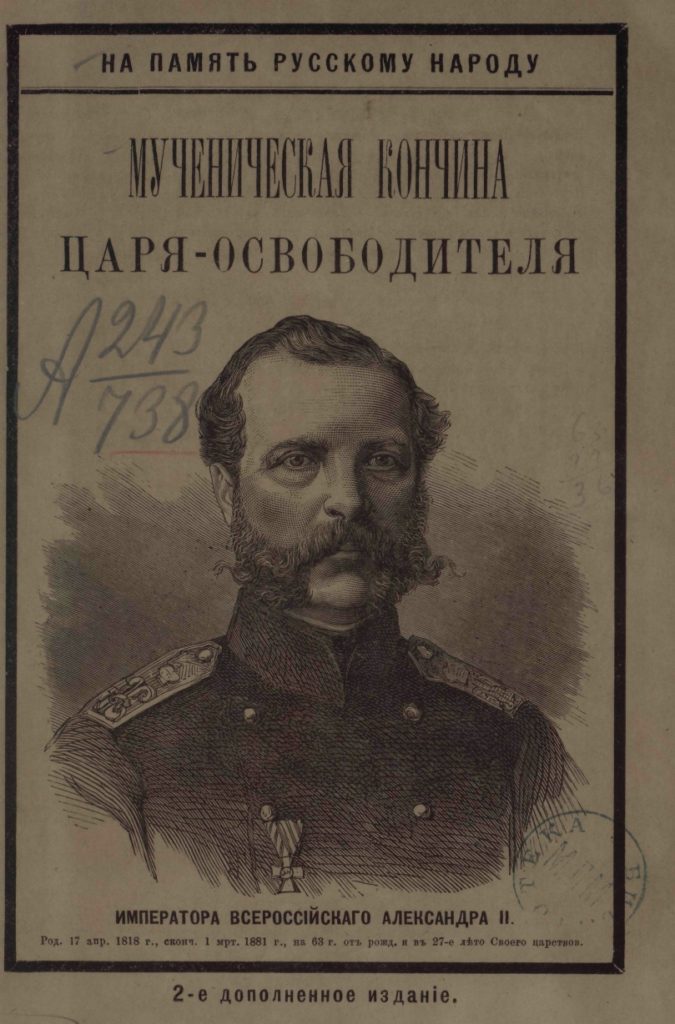
Related

Martyrdom of the emperor tsar-liberator of the All-Russian Alexander II, emperor of Russia from 1855 to 1881, "Czar Liberator".

Martyrdom of the emperor tsar-liberator of the All-Russian Alexander II, emperor of Russia from 1855 to 1881, "Czar Liberator".

Martyrdom of the emperor tsar-liberator of the All-Russian Alexander II, emperor of Russia from 1855 to 1881, "Czar Liberator".

Martyrdom of the emperor tsar-liberator of the All-Russian Alexander II, emperor of Russia from 1855 to 1881, "Czar Liberator".

Martyrdom of the emperor tsar-liberator of the All-Russian Alexander II, emperor of Russia from 1855 to 1881, "Czar Liberator".

Martyrdom of the emperor tsar-liberator of the All-Russian Alexander II, emperor of Russia from 1855 to 1881, "Czar Liberator".

Martyrdom of the emperor tsar-liberator of the All-Russian Alexander II, emperor of Russia from 1855 to 1881, "Czar Liberator".

Martyrdom of the emperor tsar-liberator of the All-Russian Alexander II, emperor of Russia from 1855 to 1881, "Czar Liberator".

Alexander II, emperor of Russia from 1855 to 1881, "Czar Liberator".
Martyrdom of the emperor tsar-liberator of the All-Russian Alexander II, emperor of Russia from 1855 to 1881, "Czar Liberator".
Summary
On 1st March, 1881, Alexander was traveling in a closed carriage, from Mikhailovsky Palace to the Winter Palace in St. Petersburg. An armed Cossack sat with the coach-driver and another six Cossacks followed on horseback. Behind them came a group of police officers in sledges. On a street corner near the Catherine Canal Sophia Perovskaya gave the signal to Nikolai Rysakov and Timofei Mikhailov to throw their bombs at the Tsar's carriage. The bombs missed the carriage and instead landed amongst the Cossacks. The Tsar was unhurt but insisted on getting out of the carriage to check the condition of the injured men. While he was standing with the wounded Cossacks another terrorist, Ignatei Grinevitski, threw his bomb. Alexander was killed instantly and the explosion was so great that Grinevitski also died from the bomb blast. The constitution was never to be granted. On the site where he was killed, the Cathedral of the Resurrection on Blood was erected.
Alexander II was known as the "Tsar-Liberator" for his emancipation of the Russian serfs. The change spurred innovations in education and judicial reforms, an elaborate scheme of local self-government in large towns and rural districts were set up. The economy was prospering, railway construction boomed, trade soared, banks and factories sprang up across the country. In 1867 he sold Alaska to the United States for $7.2 million after recognizing the great difficulty of defending it against the United Kingdom or the former British colony of Canada. In 1880 Alexander announced that he was considering granting the Russian people a constitution. But for some his extraordinary efforts were too much while others believed he didn’t go far enough – one dramatic assassination attempt followed another. On March 13, 1881, the Tsar’s carriage was bombed in the streets of St. Petersburg by members of a revolutionary organization People’s Will. He emerged shaken but unhurt and wanted to see the site of the explosion and check on the wounded Cossacks that accompanied him. As he made his way over, another terrorist threw his bomb. Fatally wounded, Alexander died an hour later.
Nothing Found.
